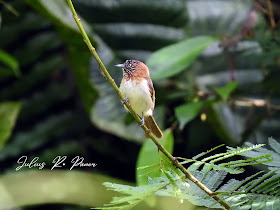One thing I like about birding is
that it never isolated me from the usual things I do like staying in the
outdoors. In fact it makes my outdoor trip even fruitful with the added
activities other than trekking, trail running and even camping in the
mountains. Birding is perhaps one of the more special activities I do in the
outdoors and aside from keeping close bonds with the Big Year team I am also
having greater opportunities to know the indigenous peoples dwelling in the
highlands of Mindanao.
In an invitation sent by naturalist
and environmental advocate Joshua I was able to visit the beautiful place of
Karilongan in Baguio District, Davao City together with Tonton and John Paul.
The main goal was to see the Southern Silvery Kingfisher which had been
frequently visible until I got there. Nonetheless, several lifers and good
highland birds were spotted during the visit. The life list of Tonton had us
embracing 40 species including some personal favorites like Philippine Cuocal,
Everett’s White Eye, Orange-lined Sunbird, Mindanao Pygmy Babbler, Turquoise
Flycatcher, Sulphur-billed Nuthatch, Orange-bellied Flowerpecker, Coleto and
Mindanao Hornbill. Joshua also said the place is a perching site of the
Philippine Eagle which I am aching to see this year.
 |
| Sulphur-billed Nuthatch |
 |
| Coppersmith Barbet |
 |
| Coleto |
 |
| Turquoise Flycatcher |
 |
| Pied Bushchat |
Aside from being just a mere
highland addict like me, Joshua is also handling a commendable project in Karilongan
called The Ovu Manubu Eco Cultural Adventure, a project where both natural and
cultural attributes in the place are being merged together to form a unique
destination that resembles my very own Bagobo Cultural Village in Tibolo.
It is good that the IP community
was able to partner with the Euro Generics International Philippines
Foundation, Inc. in employing sustainable community-based enterprises through
ecotourism that would somehow empower the community in managing its ancestral
domain and safeguarding their rich natural resources. The core strategy is to
train them on biodiversity-friendly enterprise thereby shying them away from
the traditional farm practices which have been detrimental to the environment
over the years. For now, they are bent on reforesting a huge portion of Baguio
District.
So what is in store if you go to
the village? A short trek off single track along the border of Karilongan’s
mountain range and river is a warm up experience before reaching a sturdy
hanging bridge which I believe is one of the most beautiful hanging bridges in
Mindanao. And then another hike through a community-managed nursery in a
farmland up to a stream where the Silvery Kingfisher resides is a breather of
sort. In a site opposite the stream is a sanctuary of highland birds where the
1,083 foot trail also culminates.
It
is definitely not a walk in the park trekking the steep 1,083-step trail. But
with the good vegetation and bird species along the way somehow could ease the
strain of uphill trekking. The trail ends in a modest huts of Ovu Manobu and a
replica of a man’s palm that serves as photo op site with the beautiful
panorama of the entire Davao City as background. And just like our Bagobo Village in Tibolo,
the food in Karilongan is over and above all experiences in this paradise
highlighted by delicacies cooked in bamboo stems.
Further, Joshua told
us that a stay in the village overnight would give us first-hand site of a
magnificent sunrise and at the same time increases our chances of seeing the
Rufous Hornbill and maybe Philippine Eagle. And just as I really dreamed of, my
stay overnight in this area soon should finally give me glimpse of the Southern
Silvery Kingfisher.
For overnight tour of 1,000 pesos per person gets one a chance to commune with nature and the Obu Manuvu tribe in Karilongan. The package rate includes transportation from Davao City, two native meals (dinner on the first day and breakfast on the second day), typical Obu Manuvu Hut accommodation, overflowing native coffee and other related activities. Bookings are on a first-come-first-serve basis through its facebook page.
For overnight tour of 1,000 pesos per person gets one a chance to commune with nature and the Obu Manuvu tribe in Karilongan. The package rate includes transportation from Davao City, two native meals (dinner on the first day and breakfast on the second day), typical Obu Manuvu Hut accommodation, overflowing native coffee and other related activities. Bookings are on a first-come-first-serve basis through its facebook page.


















